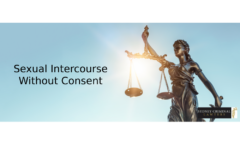Sexual Intercourse Without Consent: Rape and Sexual Assault Laws in Australia

Being accused of a sexual offence is a traumatic and difficult experience, especially if it is one which comprises an allegation of non-consensual sexual penetration.
But knowing what the law says is a good first step to understanding what the prosecution is required to establish an offence such as rape, or the sexual assault as it is known as in New South Wales.
Here’s a summary of the law.
What is rape? Is it the same as sexual assault?
In some parts of Australia, the term ‘rape’ is used to refer to the offence of sexually penetrating another person without their consent. This was also the name of the offence under common law.
But in New South Wales, the offence formerly known as rape is not referred to as ‘sexual assault’.
This may be confusing because, in other jurisdictions, ‘sexual assault’ is the name for an offence related to sexual touching and not actual penetration.
The age of consent in Australia
The age of consent refers to the minimum age a person can legally consent to sexual activity.
A number of criminal offences apply if a person engages in sexual activity with a person under the age of consent, whether or not the young person consents to the act.
The age of consent is 17 years old in South Australia and Tasmania, and 16 years old in all other jurisdictions.
In all jurisdictions, the age of consent is raised to 18 years old in all jurisdictions in circumstances where the other party is in a position of “special care”. This includes relationships between young people and guardians, teachers, instructors, prison officers and health professionals.
Current laws against non-consensual sexual penetration in Australia
Every State and Territory across Australia has a stand alone criminal offence for non-consensual sexual penetration, whether the offence is classified as ‘rape’ or ‘sexual assault’.
These offences are as follows:
New South Wales
Under New South Wales criminal law, sexual assault is an offence under section 61i of the Crimes Act 1900.
It is defined as where a person “has sexual intercourse with another person without the consent of the other person and who knows that the other person does not consent to the sexual intercourse”.
‘Sexual intercourse’ is defined by section 61H of the Act as:
“(a) sexual connection occasioned by the penetration to any extent of the genitalia (including a surgically constructed vagina) of a female person or the anus of any person by:
(i) any part of the body of another person, or
(ii) any object manipulated by another person,
except where the penetration is carried out for proper medical purposes, or
(b) sexual connection occasioned by the introduction of any part of the penis of a person into the mouth of another person, or
(c) cunnilingus, or
(d) the continuation of sexual intercourse…”
Victoria
Under Victorian criminal law, the offence of rape is contained in section 38 of the Crimes Act 1958 (VIC).
The section states as follows:
(1) A person (A) commits an offence if—
(a) A intentionally sexually penetrates another person (B); and
(b) B does not consent to the penetration; and
(c) A does not reasonably believe that B consents to the penetration.
(2) A person who commits an offence against subsection (1) is liable to level 2 imprisonment (25 years maximum).
Queensland
Under Queensland criminal law, the offence of rape is contained in section 349 of the Qld Criminal Code 1899 (Qld).
The section states as follows:
(1) Any person who rapes another person is guilty of a crime.
Penalty:
Maximum penalty—life imprisonment.
(2) A person rapes another person if—
(a) the person engages in penile intercourse with the other person without the other person’s consent; or
(b) the person penetrates the vulva, vagina or anus of the other person to any extent with a thing or a part of the person’s body that is not a penis without the other person’s consent; or
(c) the person penetrates the mouth of the other person to any extent with the person’s penis without the other person’s consent.
(3) For this section, a child under the age of 12 years is incapable of giving consent.
(4) The Penalties and Sentences Act 1992, section 161Q states a circumstance of aggravation for an offence against this section.
(5) An indictment charging an offence against this section with the circumstance of aggravation stated in the Penalties and Sentences Act 1992, section 161Q may not be presented without the consent of a Crown Law Officer.
Tasmania
Under Tasmanian criminal law, the offence of rape is contained in section 185 of the Tasmanian Criminal Code 1924 (Tas).
The section states as follows:
(1) Any person who has sexual intercourse with another person without that person’s consent is guilty of a crime.
Charge: Rape.
Australian Capital Territory
Under ACT criminal law, the offence of rape is contained in section 54 of the Crimes Act 1900 (ACT).
The section states as follows:
(1) A person who engages in sexual intercourse with another person without the consent of that other person and who is reckless as to whether that other person consents to sexual intercourse is guilty of an offence punishable, on conviction, by imprisonment for 12 years.
(2) However, for an aggravated offence against subsection (1), the maximum penalty is imprisonment for 15 years.
Note Section 72AA (Aggravated offences—pt 3 offences involving family violence) makes provision in relation to an aggravated offence against this section.
(3) A person who, acting in company with any other person, engages in sexual intercourse with another person without the consent of that other person and who is reckless as to whether that other person consents to the sexual intercourse is guilty of an offence punishable, on conviction, by imprisonment for 14 years.
(4) However, for an aggravated offence against subsection (3), the maximum penalty is imprisonment for 18 years.
(5) For this section, proof of knowledge or recklessness is sufficient to establish the element of recklessness.
Northern Territory
Under Northern Territory criminal law, the offence of rape is outlined under section 192 of the Criminal Code Act 1983 (NT) .
The section states as follows:
(1) For this section, consent means free and voluntary agreement.
(2) Circumstances in which a person does not consent to sexual intercourse or an act of gross indecency include circumstances where:
(a) the person submits because of force, fear of force, or fear of harm of any type, to himself or herself or another person;
(b) the person submits because he or she is unlawfully detained;
(c) the person is asleep, unconscious or so affected by alcohol or another drug as to be incapable of freely agreeing;
(d) the person is incapable of understanding the sexual nature of the act;
(e) the person is mistaken about the sexual nature of the act or the identity of the other person;
(f) the person mistakenly believes that the act is for medical or hygienic purposes; or
(g) the person submits because of a false representation as to the nature or purpose of the act.
(3) A person is guilty of an offence if the person has sexual intercourse with another person:
(a) without the other person’s consent; and
(b) knowing about or being reckless as to the lack of consent.
Maximum penalty: Imprisonment for life.
(4) A person is guilty of an offence if the person performs an act of gross indecency on another person:
(a) without the other person’s consent; and
(b) knowing about or being reckless as to the lack of consent.
Maximum penalty: Imprisonment for 14 years.
(4A) For subsections (3) and (4), being reckless as to a lack of consent to sexual intercourse or an act of gross indecency includes not giving any thought to whether or not the other person is consenting to the sexual intercourse or act of gross indecency.
(5) Any person who attempts to commit an offence against subsection (3) is liable to imprisonment for 7 years.
(6) Any person who, being an adult, attempts to commit an offence against subsection (3) upon another person who is under the age of 16 years is liable to imprisonment for 14 years.
(7) Any person who attempts to commit an offence against subsection (3) and in the course of such an attempt causes harm to the other person is liable to imprisonment for 14 years.
(8) Any person who attempts to commit an offence against subsection (3) and thereby causes serious harm to the other person is liable to imprisonment for 17 years.
South Australia
Under South Australian criminal law, the offence of rape is contained in section 48 of the Criminal Law Consolidation Act 1935 (SA).
The section states as follows:
(1) A person (the “offender”) is guilty of the offence of rape if he or she engages, or continues to engage, in sexual intercourse with another person who—
(a) does not consent to engaging in the sexual intercourse; or
(b) has withdrawn consent to the sexual intercourse,
and the offender knows, or is recklessly indifferent to, the fact that the other person does not so consent or has so withdrawn consent (as the case may be).
Maximum penalty: Imprisonment for life.
(2) A person (the “offender”) is guilty of the offence of rape if he or she compels a person to engage, or to continue to engage, in—
(a) sexual intercourse with a person other than the offender; or
(b) an act of sexual self-penetration; or
(c) an act of bestiality,
when the person so compelled does not consent to engaging in the sexual intercourse or act, or has withdrawn consent to the sexual intercourse or act, and the offender knows, or is recklessly indifferent to, the fact that the person does not so consent or has so withdrawn consent (as the case may be).
Maximum penalty: Imprisonment for life.
(3) In this section—
“compels”—a person compels another person if he or she controls or influences the other person’s conduct by means that effectively prevent the other person from exercising freedom of choice;
“sexual self-penetration” means the penetration by a person of the person’s vagina, labia majora or anus by any part of the body of the person or by any object.
Western Australia
Under Western Australian criminal law, the offence of rape is contained in section 325 of the Criminal Code Act 1913 (WA).
The section states as follows:
(1) A person who sexually penetrates another person without the consent of that person is guilty of a crime and is liable to imprisonment for 14 years.
Alternative offence: s. 322(2) or (4), 323 or 324.
(2) If the offence is committed by an adult offender in the course of conduct that constitutes an aggravated home burglary, the court sentencing the offender must, notwithstanding any other written law, impose a term of imprisonment of at least 75% of the term specified in subsection (1).
(3) If the offence is committed by a juvenile offender in the course of conduct that constitutes an aggravated home burglary, the court sentencing the offender —
(a) must, notwithstanding the Young Offenders Act 1994 section 46(5a), impose either —
(i) a term of imprisonment of at least 3 years; or
(ii) a term of detention under the Young Offenders Act 1994 of at least 3 years,
as the court thinks fit; and
(b) must not suspend any term of imprisonment imposed; and
(c) must record a conviction against the offender.
(4) Subsection (3) does not prevent a court from —
(a) making a direction under the Young Offenders Act 1994 section 118(4); or
(b) making a special order under Part 7 Division 9 of that Act.
Meaning of sexual consent in Australia
There are a variety of terms used to define ‘sexual consent’ in different parts of Australia.
In Victoria and Tasmania, sexual consent to referred to as a “free agreement”. In New South Wales, South Australia, the Northern Territory and the ACT it is a “free and voluntary agreement”. Finally in Queensland and Western Australia the standard is “consent freely and voluntarily given” (Qld and WA).
In the “affirmative consent” jurisdictions of Tasmania, the ACT, Victoria and NSW a person cannot be said to have reasonable grounds to believe that there was consent if that person fails to say or do anything to ascertain whether or not the other person consents. In other jurisdictions, there is no requirement to proactively communicate consent.
Consent to sexual activity can be withdrawn at any time, and consenting to one type of sexual activity does not mean consent to all future sexual activity.
There are also a variety of circumstances which may ‘vitiate’ consent. For example, section 61HE of the Act provides that a person does not consent to sexual activity if he or she engages in sexual activity, or incites anyone to do so, in circumstances where he or she:
- knows the alleged victim does not consent, or
- is reckless as to whether the alleged victim consents, or
- has no reasonable grounds to believe the alleged victim consents.
In deciding whether there is consent, the court must consider any steps taken by the alleged offender to ascertain whether there is consent.
The court cannot take into account any self-induced intoxication by the alleged offender.
The section makes clear there is no consent where the alleged victim:
- does not have the capacity to consent due to factors such as their age (outlined above) or cognitive ability, or
- does not have the opportunity to consent because they are unconscious or asleep, or
- consents because of threats of force or terror, or
- consents due to being unlawfully detained, or
- consents because of a mistaken belief
(a) as to the identity of the alleged offender,
(b) that the two are married,
(c) that the activity is for health or hygienic purposes, or
(d) that arises through any fraud.
The grounds upon which it may be established that the alleged victim did not consent include that he or she:
- was substantially intoxicated,
- was intimidated, coerced or threatened in any way, or
- was under the authority or trust of the alleged offender.
The section further makes clear that a failure to resist the activity not in itself to be regarded as establishing consent.
Guilty mind for rape offences in Australia
The required ‘guilty mind’ for a defendant for rape charges varies between different Australian jurisdictions.
In NSW, Victoria, South Australia, the Northern Territory and the ACT an offence will be made out if prosecutors can prove that the defendant was either:
- actually aware of lack of consent; or
- was reckless as to whether the alleged victim was consenting.
In NSW and Victoria, an offence can also be made out if prosecutors prove that the defendant had a belief that the alleged victim was consenting, but this was not a reasonable belief.
In Western Australia, Tasmania and Queensland prosecutors do not need to prove that the defendant knew the alleged victim was not consenting. Instead, prosecuted will need to disprove the raising of a ‘mistake of fact defence’ which argues he defendant honestly and reasonably believe that the complainant was consenting at the time of the sexual activity.
In all jurisdictions, any belief of the defendant is taken to be that of a sober person, even if the defendant was voluntarily intoxicated by drugs or alcohol at the time.
Defences to Australian rape offences
In addition to the requirement that the prosecution must prove each element of the relevant offence, it must also disprove beyond reasonable doubt any of the following defences if properly raised:
- Duress, which is where you were threatened or coerced,
- Necessity, where the act was necessary to avert danger, and
- Self-defence, where you engaged in the act to defend yourself or another.
Charged with a sexual offence?
If you have been charged with sexual assault and require the assistance of lawyers who are vastly experienced and have an outstanding track record of defending these cases, call Sydney Criminal Lawyers® 24/7 on (02) 9261 8881 to arrange a free first conference.






